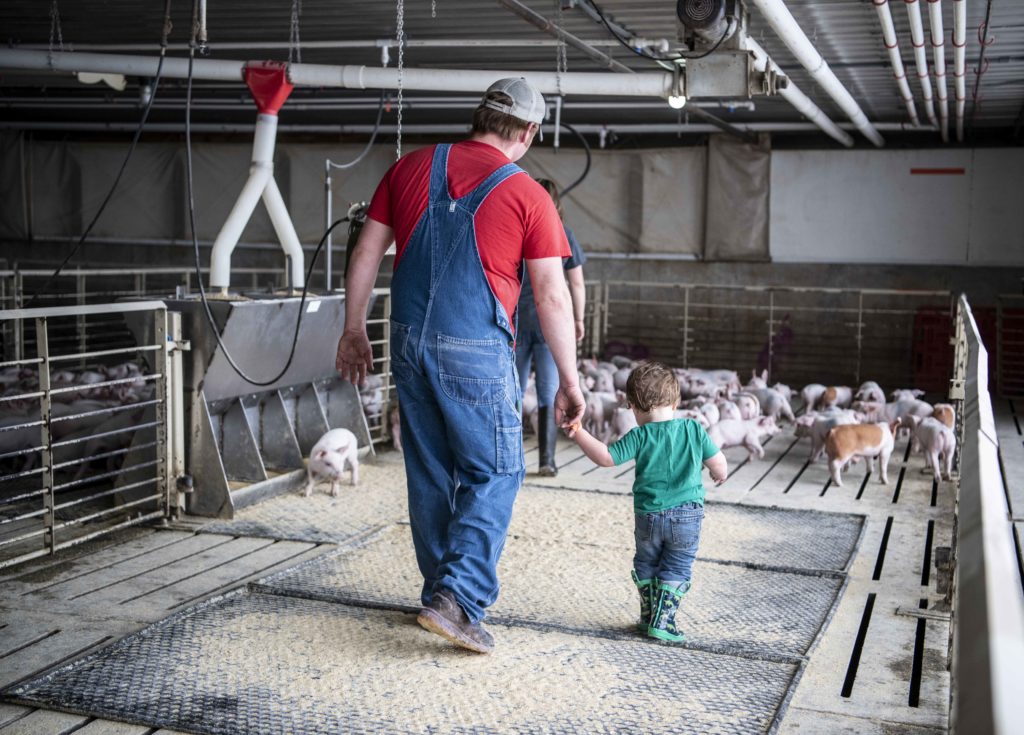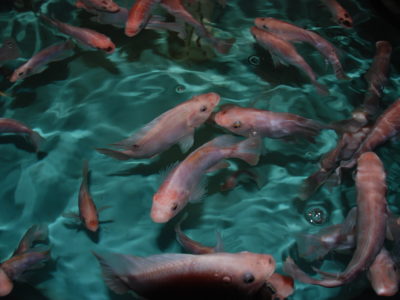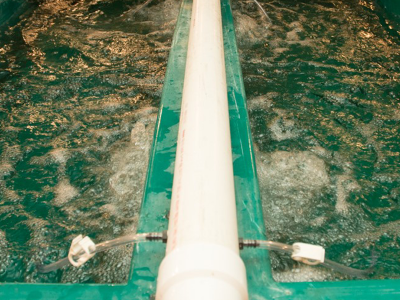Leading by example
09-19-2019 in Aquaculture

WEST DES MOINES, IOWA – September 19, 2019 – Livestock production is important to Iowa’s economy, contributing $48.5 billion to the state annually, up more than $17 billion from the 2012 U.S. Census of Ag.
But Iowa isn’t the only state relying on agriculture.
Across the Midwest, other states are hoping to shore up their economies by growing the livestock industry, taking their inspiration from the Coalition to Support Iowa’s Farmers (CSIF) to help farmers looking to livestock to diversify their operations and add value to the grain and forage grown on the most fertile land on earth. Just as CSIF offers siting and neighbor relations assistance to farmers, similar organizations in other states are following suit, using CSIF as a model and inspiration.
Illinois
“We copied everything from them,” says Nic Anderson, Illinois Livestock Development Group Business Developer. Illinois, of course, put their own twist on the idea, but ILDG was formed around the same time as CSIF. The Illinois group spawned from an economic impact study aimed at identifying ways to keep livestock agriculture from departing the state. A Farm Bureau connection identified the CSIF model as a potential plan.
ILDG provides expertise on livestock facility regulation, help in transitioning farms to the next generation, and public relations. Like Iowa’s version, it is funded by the state’s farm and commodity groups. It also assists farmers facing litigation.
“There are challenges here, of course,” says Anderson, citing neighbor relations that often include jealousy over differences in cash rent for livestock operators and absentee landowners who don’t want the grain grown on their farm to go toward livestock feed. “But the real reward is seeing the excitement in farm families when they rejuvenate their investment in ag. That’s pretty powerful. We may compete with Iowa, but we appreciate the footprint and the roadmap we used to create our program. It would be a very different picture without their lead.”
South Dakota
Steve Dick, executive director of Ag United for South Dakota, remembers very well when his organization began in 2005. “South Dakota Farm Bureau President Scott VanderWal (now also American Farm Bureau Federation Vice President), returned from a meeting in Des Moines excited about a new organization being formed there,” says Dick. By January 2005, Ag United was up and running, funded by commodity groups, industry stakeholders, and individual farmers. Dick even made a trip to Iowa to meet with CSIF staff.
Ag United Started with a goal that was focused ‘one-half on farmer services and one-half on education.’ Now the group takes a more community-focused approach, including providing background information to local officials to help them in ag zoning. Farmers in South Dakota must first obtain a county permit, then a state permit in a state that heavily regulates livestock. Ag United assists farmers with presenting their case to officials and communicating their plans with their neighbors. “It can be an intimidating process, especially for someone who has never spoken in front of a group,” says Dick. “We try to make sure there are friendly faces in the room.”
Dick also provides tools to farmers to help them share their story with the media. “Fewer people are involved in ag than ever before and there really is a disconnect,” says Dick. “Many people know a farmer, or grew up visiting their grandparents’ farm, but the challenge is getting people to realize how much farming has changed in the last generation. It’s not Grandpa’s farm anymore.”
Ag United continues to look to CSIF as what Dick calls the “standard for livestock coalitions across the Midwest” as he works to provide opportunity for the resurgence of young farmers in his state.
Nebraska
Nebraska, too, followed Iowa’s early lead.
The Alliance for the Future of Agriculture in Nebraska (AFAN) turns 15 next year. Its main focus is livestock growth and development, working one on one with producers through the state and local permitting process.
“Like the Iowa coalition, we’re here to be a resource for farmers,” says AFAN Executive Director Steve Martin.
They also work to help local officials understand livestock production so their rules and regulations remain practical and workable. Unlike CSIF, AFAN has a lobbying branch that Martin says accounts for around 10-15% of their time, and a good deal of time is spent on ag-related economic development.
Martin says one of the greatest challenges in Nebraska is facing the opposition to livestock that often comes from a small, albeit very vocal, group of people. “It makes people think everyone is against livestock, when that isn’t necessarily true.” But farmers, by nature not inclined to “put themselves out there,” can be hesitant to speak up and show public support.
Nebraska faces demographic challenges as well, with 1.5 million of its 1.9 million people living within 60 miles of the Missouri River. “It makes us be strategic about where we locate new ventures,” says Martin.
Like its Iowa counterpart, the majority of the group’s funding comes from commodity groups, with some private ag business and producer partners.
“Just like Iowa,” says Martin, “ag is everything in Nebraska. Without it, we wouldn’t have much of an economy.”
North Dakota
CSIF’s influence doesn’t end with the early days of the farmers helping farmers movement. It continues today.
The North Dakota Livestock Alliance was formed in 2017, not only with CSIF as a model, but with its direction. CSIF Executive Director Brian Waddingham skyped and had conference calls with the North Dakota program instigators and offered advice as the organization was being formed.
“We have similar goals and mission,” says NDLA Executive Director Amber Boeshans. “Brian was able to help us with the organizational structure and start us off on the right foot.”
Unlike Iowa, NDLA relies on North Dakota Department of Environmental Quality staff for siting assistance to farmers, and much of its community outreach is Checkoff funded. Their efforts are directed at helping farmers grow responsibly.
“Brian helped us focus on our niche, and how we can best help our farmers,” says Boeshans. “He told us to be flexible and think on our feet.”
Boeshans says her state is excited to welcome animal agriculture. Always a beef state, pork production is gaining in popularity, especially among young producers.
“There’s so much unique opportunity here, and young producers aren’t afraid to step out of their comfort zone,” says Boeshans. “We have available land and diverse crop systems. Our low pig density is ideal for providing the needed biosecurity for sows.”
“We’re thriving here, and our organization is now where we thought it would be in 5 years,” she adds. “We have Brian and his colleagues to thank for helping us find our footing and our place as a key player in North Dakota agriculture.”
Indiana
Indiana’s version of a livestock coalition has more direct roots in Iowa.
Megan Ritter, Executive Director of Administration for the Indiana Farm Bureau, got her start at CSIF as a Field Specialist, where she learned farmers are valuable assets to their communities who often need help telling their stories.
Indiana’s effort began with political overtones around 15 years ago, then reappeared in a more practical form in 2011 when Ritter and a colleague began comparing ideas. The proactive movement has gained steam ever since.
To encourage farmers to call for help in doing the right thing as they start or expand their livestock operations, Indiana Farm Bureau organized a ground response team comprised of experts from various ag producer groups. The team meets with farmers one on one, provides a tool kit similar to CSIF, and calls in added expertise as needed.
Like Illinois, it also focuses on litigation, working with the Indiana Agricultural Law Foundation.
“We’re here to provide security for people trying to do things right and make a living producing the food our world needs,” says Ritter. “We’re able to help these folks through some of the most challenging times in the history of their family farm, and give them hope they can continue to invest. We have strong leaders here in Indiana who understand the rubber meets the road on the individual farm level.”
It’s about farmers helping farmers – one at a time, farm by farm, community by community, state by state – all under an Iowa model that puts the individual farmer first.
“Ag isn’t, and never should be, a one-size-fits-all,” says Ritter. “Groups like this give us the benefit of having everyone on the same page, and provide a response greater than any one entity could, as we serve farmers one on one. This is what grass roots support looks like. It’s a crucial part of ag today.”
The Coalition to Support Iowa’s Farmers was created by farmers to help farmers raise livestock successfully and responsibly. It’s a partnership involving the Iowa Beef Industry Council, Iowa Cattlemen’s Association, Iowa Corn Growers Association, Iowa Farm Bureau Federation, Iowa Pork Producers Association, Iowa Poultry Association, Iowa Soybean Association, Iowa Turkey Federation and Midwest Dairy Association. The non-profit, non-partisan organization aids farmers at no cost. CSIF does not lobby or develop policy. Farm families wanting a helping hand can contact the coalition at 1-800-932-2436.
(By Terri Queck-Matzie for CSIF. Queck-Matzie is a freelance writer from Greenfield).
-30-
Recommended News

How Aquaculture Growth in Iowa Supports Economy, Creates New Jobs for Farmers
Iowa is one of the many states benefiting from its growing aquaculture industry. According to the Iowa Department of Agriculture, aquaculture generated more than $3.8 million in sales in Iowa...
Read More
CSIF Event Showcases Iowa’s Emerging Aquaculture Industry
The 2022 Aquaculture Conference, hosted by the Coalition to Support Iowa’s Farmers (CSIF), recently drew more than 100 attendees to learn more about Iowa’s newest livestock industry.
Read More
CSIF Event Highlights Iowa’s Emerging Aquaculture Industry
Contact: Brian Waddingham 515.225.5531 bwaddingham@supportfarmers.com WEST DES MOINES, IOWA – March 28, 2019 – The Coalition to Support Iowa’s Farmers (CSIF) recently hosted the 2019 Aquaculture Conference to...
Read More